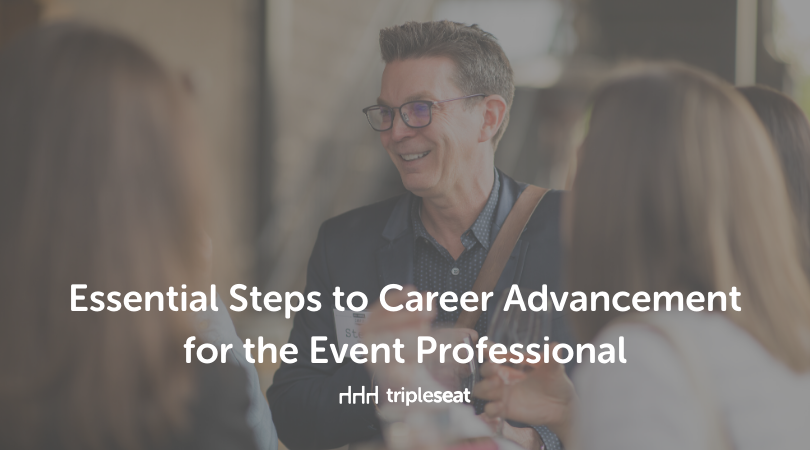Essential Steps to Career Advancement for the Event Professional

A mentor once told me “the biggest room in the house is the room for improvement.” Career development is a lifelong process of learning, changes, and growth. Whether you’re a first-time server, seasoned event manager, or someone who wishes to open their very own restaurant someday, there is always something to learn and improve on.
For me, improvement means that I am not only learning from my previous mistakes to make better decisions in the future, but also setting time aside to learn entirely new concepts and tactics or ways of thinking to ultimately be more successful.
Making education and growth in your career a priority prepares your mindset to set time aside to sit down and focus on complete actions that will help you grow over time. Here are eight things that you should never stop doing throughout your career.
1. Keep your resume up to date
Even if you’re happy in your current position or organization, always have an updated resume ready. You never know who you will meet or what opportunities will cross your path and you’ll be so glad that you have current and accurate information to share.
2. Optimize your LinkedIn profile
Your LinkedIn profile is an extension of your resume that also offers validation about your background based on connections and recommendations. Here are the five most important areas to continually update to make sure your profile is fully optimized and working on your behalf.
- Profile photo: A professional-looking headshot of just you. No selfies or group shots. You’ll want good lighting, business casual attire, and portrait mode.
- About section: Write this section last. What are the overall themes, strengths, and expertise that clearly stand out from your profile? What are some tangible goals that you want to achieve or learn in your career? Make it clear what you would bring to a new role and also that you are willing to gain any new skills that would be needed.
- Experience: Include each past and current job with the dates and full description of your role. Take the job description that was provided to you when you were hired and rewrite it in your own words. Bullet points work well here as they are easier to skim through. Don’t sell yourself short either — don’t just write, “I managed 40 private events per month.” Provide context and elaborate on exactly how you successfully managed those events. “Managed 40+ private events per month, which ranged anywhere from 10 to 250 guests. Duties included all post-sale communication, menu designing, event decorating, and monthly reporting.”
- Connections: Should be genuine and from people that you know both personally and professionally, people who you have worked with in the past, people you have met networking, and people who you have had good conversations with. Don’t be afraid to decline connection requests from people who you don’t know.
- Recommendations: The best way to actually get colleagues to write you a recommendation is simply to ask. Also ask them to include examples of how you excelled within the role. Offer to exchange recommendations for each other. Having a minimum of three quality recommendations — preferably one from each past role — is ideal.
3. Attend free online courses
Continuing your education in the traditional way of a classroom doesn’t have to cost you an arm and a leg. There are many free online courses and certifications offered; the hardest part is picking which topic to study first. Don’t forget to add any completed courses or certifications to your LinkedIn page! Here are a few that we recommend:
- HubSpot: Sales and marketing courses
- Coursera: Offers courses from leading universities and top organizations
- HarvardX: Online courses from Harvard University
- OpenCulture: Download audio and video courses from top universities
- Future Learn: Courses, programs and certificates offered by top universities, business schools and organizations
4. Join a board or community
Joining a local board or community is two-fold; it allows you to give back by lending your experience to help others achieve a goal. And you’ll learn from others who may be experts in other areas all while also growing your network in more of an organic fashion.
5. Attend networking events
The saying “You have to know someone to get somewhere” isn’t exactly an old wives’ tale. Knowing the right person — or someone who can connect you with the right person — opens doors that may not necessarily be opened otherwise. Those doors may lead to the job that feels as if it were created for you. Get out and network and genuinely make friends with people in the industry that you either want to grow in or join. Networking events can be intimidating as the connections don’t always feel genuine, but the key is to find commonalities that you both care about whether that is personal or professional. Even though that person may not be able to directly help you, they may have someone in their network that can. Both free and paid events are out there; there are also apps dedicated to finding an event near you. Grab a willing friend and find new people to get to know. Here are a few places to start:
- Eventbrite
- Local Chambers of Commerce
- Meetup
- Woman in Hospitality
- The Event Planner Expo
- Leads Groups
- Event Planners + Coordinators on LinkedIn
- Event Planning + Event Management on LinkedIn
6. Mentorship
Finding a colleague or someone in your industry or in an industry you are trying to break into is the perfect place to start your networking and growth adventure. Each relationship will be different based on the two individuals involved. I recommend picking a recurring cadence to meet. The cadence will need to be selected based on what works for both of your schedules, and putting it on the calendar for the next six to 12 months puts a sense of urgency and priority on the meetups and also holds you both accountable. There are two structures that work best when meeting with a mentor or mentee.
Project-based: An ongoing project that will have physical items to share either in print or online that can spark questions that each will have, recommendations that the mentor can share, and provide other feedback to grow your career.
Goal-based: At the first meeting, you should establish a SMART (specific, measurable, achievable, relevant, time-based) goal that you can work on together over the course of mentorship, such as getting prepared for a speaking engagement or a writing feature in an upcoming magazine or blog.
7. Maintain a reading list
Reading not only books but articles, blogs, newspapers, and industry email newsletters is another way to continue your education without the larger commitment of an online course or certificate program. Beyond career growth and business-related books, don’t pass over the self-help section — you can find valuable information on breaking bad habits, letting go of the things you don’t need, how to be a leader or influencer, and so much more. Reading is such an easy way to introduce new tactics and techniques into your daily life; you can also read at your own pace where it works best for you. You should always be actively reading, no matter what your pace is.
8. Be in touch with your emotional intelligence (EQ)
Emotional intelligence is how to accurately read not only your own emotional state and behaviors, but those of others. You can be the smartest person in the room, but if you are lacking in empathy and understanding of why other people feel and react the way they do to a given situation, you won’t get far. Your intelligence quotient (IQ) is important because it is a direct representation of the knowledge that you have. Your EQ is just as important, and — depending on the scenario or context — can be worth more than your IQ. Unlike your IQ, you can dramatically improve your EQ if you educate yourself and put into practice all that you have learned. There are free tools and surveys available online to get a baseline reading and then actionable information you can put into practice in your daily life.
Make career growth a priority
Growing both personally and in your career is a lifelong process that should always be made a priority. Even though our days and weeks are jammed packed with mandatory meetings and mile-long to-do lists, it’s important to make the time to pay attention to these eight activities that can improve your skills and career.


